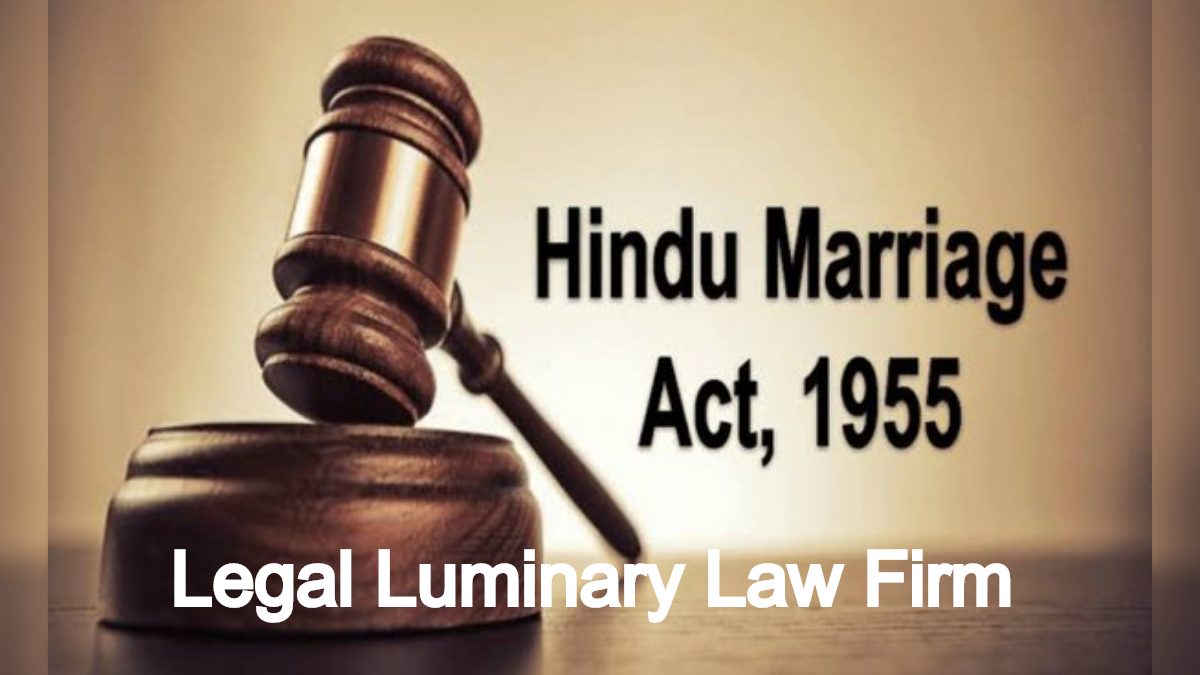Matrimonial Matters Simplified: Insights into Hindu Marriage Act, 1955
Matrimonial Matters Simplified: Navigating the legalities of marriage can be a complex endeavor, especially when facing disagreements or considering dissolution. In India, the Hindu Marriage Act, 1955 (HMA) serves as the cornerstone legislation governing marriage and related matters for Hindus and those following Hinduism, Buddhism, Jainism, or Sikhism. This article by Legal Luminary Law Firm aims to demystify the HMA, providing you with a clear understanding of its key provisions and how they might impact you.
Matrimonial Matters Simplified: Insights into Hindu Marriage Act, 1955 (Legal Luminary Law Firm)
The Foundation: Conditions for a Valid Hindu Marriage
The HMA establishes specific conditions that must be met for a Hindu marriage to be considered valid. These conditions ensure informed consent and protect the rights of both spouses. Let’s delve into these essential requirements:
- Monogamy: The HMA practices monogamy, meaning neither party can have another spouse while married.
- Minimum Age: Both bride and groom must be of legal age to marry. Currently, the minimum age is 18 for females and 21 for males.
- Sound Mind: Both individuals must be mentally sound and capable of giving valid consent.
- Religion: At least one party to the marriage must be Hindu, Buddhist, Jain, or Sikh.
- No Prior Marriages: Neither party can be in an existing, valid marriage at the time of the ceremony.
- Sapinda Relationship: Close blood relatives, as defined by the HMA, are prohibited from marrying.
Grounds for Divorce Under the Hindu Marriage Act
The HMA outlines various situations that can be cited as grounds for seeking a divorce. If you find yourself contemplating divorce, it’s crucial to understand these grounds and how they might apply to your specific circumstances. Here are some of the key grounds recognized by the HMA:
- Adultery: If a spouse engages in extramarital sexual intercourse.
- Cruelty: This can encompass physical, mental, or emotional abuse.
- Desertion: When a spouse abandons the other without a reasonable cause for a continuous period of at least three years.
- Conversion: If one spouse converts to a religion not recognized under the HMA.
- Mental Illness: Incurable mental illness of a spouse for a continuous period of at least three years.
- Presumed Dead: If a spouse is missing (presumed dead) for at least seven years.
- Mutual Consent: Both spouses can agree to a divorce by living separately for a minimum of one year or by mutual consent with a minimum separation of two years.
Essential Considerations: Nullity of Marriage and Judicial Separation
The HMA also addresses situations where a marriage might be declared null and void, meaning it was never legally valid from the outset. This can occur if any of the mandatory conditions for a valid marriage were not met at the time of the ceremony.
Furthermore, the HMA recognizes judicial separation as an alternative to divorce. This legal separation allows spouses to live separately while remaining married. It can be a temporary measure for couples seeking time apart to reflect on their relationship or a permanent arrangement if reconciliation is not desired.
FAQs: Clarifying Common Doubts
The HMA allows for judicial separation, which offers a legal framework for living apart while remaining married.
The duration of a divorce case can vary depending on the complexity and whether there’s mutual consent. Contested divorces can take years, while those with mutual consent can be finalized relatively quickly.
The HMA provisions on division of property and spousal support (maintenance) will be applied by the court, considering factors like the length of the marriage, the earning capacity of each spouse, and the presence of children.
While not mandatory, legal representation by an experienced divorce lawyer can be invaluable in navigating the legalities, protecting your rights, and ensuring a fair outcome.
The HMA prioritizes the well-being of children during divorce proceedings. The court will determine child custody and visitation arrangements based on the child’s best interests.
Legal Luminary Law Firm: Your Trusted Guide Through Matrimonial Matters
If you’re facing marital discord or contemplating divorce, seeking legal guidance is crucial. The Legal Luminary Law Firm’s experienced family law attorneys actively listen to understand the emotional complexities involved in your case. We will work tirelessly to protect your rights and achieve a favorable outcome in your case. Contact us today for a consultation to discuss your specific situation.
Read More
- Unraveling Legal Evidence: Understanding the Indian Evidence Act, 1872
- Celebrating the Significance of the Specific Relief Act, 1963: Key Provisions and Legal Insights
- Family Matters Resolved: Navigating Hindu Succession Act, 1956
- Criminal Justice Unveiled: Navigating the Code of Criminal Procedure (CrPC), 1973
- Timing Matters: Insights into the Limitation Act, 1963
- Ministry of Law and Justice of India website

